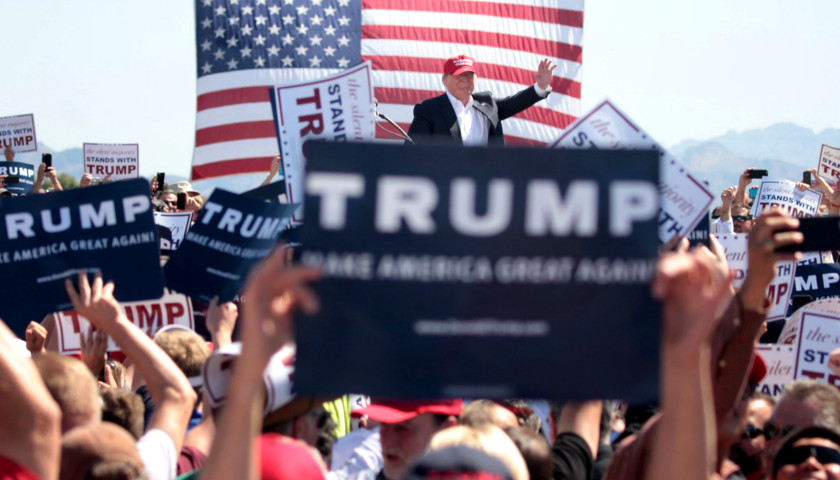by Dan Gelernter
People think of Trump Derangement Syndrome as mostly a phenomenon of the Left, and mostly unprecedented. It’s easy to get the impression that Donald Trump has taught the Left to hate as they have never hated, and that all previous Republican presidents were moderate by comparison and much more broadly acceptable to America.
But the Left was just as vicious about George W. Bush in his day, and they hated him just as much. He was called a threat to world peace, a devotedly evil man, a stupid man, or all of these: To quote a 2004 Slate article, “he chose stupidity. Bush may look like a well-meaning dolt. On consideration, he’s something far more dangerous: a dedicated fool.”
What is unusual about Trump is not that the Left hates him, but that a lot of the Right hates him, too. And by “a lot of the Right” I don’t refer to actual voters, who turned out for Trump in unprecedented numbers and with unprecedented enthusiasm. I mean the rightist establishment—journalists, intellectuals, and professional politicians. A large portion joined the Left in espousing that Trump was a blowhard, a bully, and not a team player. They warned us that his tweets were alienating people. And by “people,” they meant themselves.
Trump’s tweets were actually hugely entertaining. They were the only good reason for checking Twitter, which I don’t do anymore. Interestingly, Trump tended to attack journalists, intellectuals, and professional politicians. He made fun of them. And there is nothing that upsets these people more than getting made fun of. No wonder they felt alienated.
Trump’s personality is a strawman. The real reason political professionals hate Trump is that Trump doesn’t believe political professionals are especially good at what they do. He doesn’t trust the traditional experts, and doesn’t think they have a good track record. When these people call Trump a “low-class loudmouth,” what they really mean is “Trump doesn’t take my advice.”
The Beltway experts were used to being listened to. They were used to guiding the elected GOP. Suddenly they were ignored. So they all sulked off to write books exposing what a terrible person Trump really was, and this allowed them to be absolved and reabsorbed by the swamp. (The swamp should properly be thought of as a gigantic martini shared by all the participants of professional politics.)
Here is a peculiar fact: Trump took the time to haggle with Boeing over the price of a new Air Force One. No ordinary Republican would do such a thing—Boeing is an important constituency. That’s why Republicans joined Senate Democrats, 98-to-1 (with Tom Cotton of Arkansas voting against) for the Senate to consider the Iran deal “not a treaty,” which allowed the deal to pass without a two-thirds majority, giving Republicans the luxury of a formal “no” vote while still giving Boeing permission to sell $16.6 billion of planes to Iran.
In comparison, Trump fighting with Boeing over the price of an airliner is exactly the sort of thing that gets the rightist establishment chortling with contempt. To them, it’s a laughably tiny amount of money and not even worth thinking about. They don’t understand the impression it makes on regular people when Trump talks about how an official had told him they could cancel the order for a mere $250 million.
The reason it makes an impression is not that people think Trump saved a huge amount of money in that particular case. It’s that people suspect the story is emblematic of how our government operates. They suspect it’s business-as-usual to be gouged for a few hundred million in everything the government does, and they suspect that most Republicans either don’t care or are complicit.
Trump, of course, was a tireless campaigner for Republicans who supported the America First agenda. He was a faithful political ally to many people who subsequently failed to stand up for him when the chips were down.
When journalists on the Right accuse Trump of not being a team player, the team they are talking about is not Republicans or even Americans, but politicians. Trump refused to act like someone who had lived his entire life inside the Beltway. He refused to trust the experts over the will of the voters. He refused to take the “I’ll-scratch-your-back-and-you-scratch-mine” attitude that has made so many people so rich at Americans’ expense.
A lot of the American Right, including many prominent writers and thinkers whom we had come to trust, revealed that in the single most important aspect of political philosophy they are functionally identical to the Left: They believe that they know better than the average American how to run the country. They believe that they know better than the average American how the average American should live his life. They may disagree with the Left about the particulars, but they agree on the fundamental principle that they, and only they, are smart enough to be in charge. They favor aristocracy over democracy.
In the 2020 election, Trump increased his share of the vote with every minority group. He was a uniting figure except when it came to the people who were used to having the GOP’s megaphone. The future of the Republican Party may or may not be Trump personally, but it is through men like him—and only through men like him—that the Republican Party and by extension American democracy will survive.
Unfortunately there are 100 Mitt Romneys in the GOP for every Ron DeSantis. But that can change. Fire your local Mitt Romney and replace him with someone who loves America and hates politics. It’s alright if he makes the Beltway experts uncomfortable. In fact, it’s good if he does.
– – –
Dan Gelernter is a columnist for American Greatness living in Connecticut.
Photo “Trump Supporters” by Gage Skidmore CC BY-SA 2.0.




